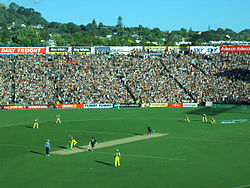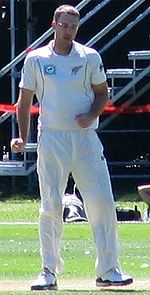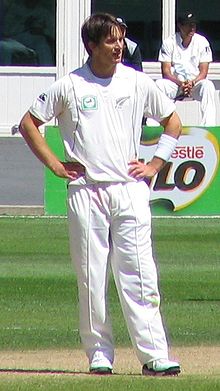- Cricket in New Zealand
-
Cricket in New Zealand 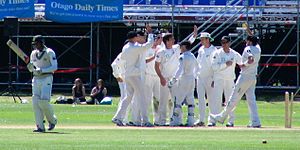
Governing body New Zealand Cricket National team New Zealand Nickname(s) Blackcaps First played 1832 Registered players 110,000 (approx) Competitions National Cricket World Cup ICC World Twenty20 ICC Champions Trophy Club Plunket Shield State Championship State Twenty20 Cricket is a popular sport in New Zealand, which is one of the ten countries that take part in Test match cricket. Cricket is the national and most popular summer sport, second only in total sporting popularity to rugby.
The national competition is not nearly as widely followed as the case with rugby, but international matches are watched with interest by a large proportion of the population. This parallels the global situation in cricket, whereby the international game is more widely followed than the domestic game in all major cricketing countries.
Contents
History
Main article: History of cricket in New ZealandSee also: History of cricket in New Zealand to 1890, History of cricket in New Zealand from 1890-91 to 1918, History of cricket in New Zealand from 1918-19 to 1945, History of cricket in New Zealand from 1945-46 to 1970, History of cricket in New Zealand from 1970-71 to 2000, and History of cricket in New Zealand from 2000-01Cricket has been played at least 100 years in New Zealand.[1] There is competition within New Zealand to win the John Drake Boot, a newly minted trophy with a silver shoe with cleats worn by the star cricket player in the 1987 World Cup Final.[2] New Zealand cricket teams compete internationally.[1] New Zealand competed in World Cup cricket competitions with teams from South Africa and Britain and Australia in 2007 and other nations; the next World Cup is scheduled for 2011.[3] Cricket has been taught as a college course.[4]
Governing body
Main article: New Zealand CricketNew Zealand Cricket, formerly the New Zealand Cricket Board, is the governing body for professional cricket in New Zealand. Cricket is the most popular and highest profile summer sport in New Zealand.
Domestic competition
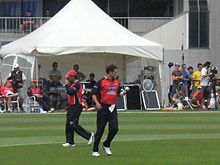 Chris Cairns starts a run-up at Eden Park in 2006
Chris Cairns starts a run-up at Eden Park in 2006
New Zealand Cricket operates the New Zealand cricket team, organising Test tours and One Day Internationals with other nations. It also organises domestic cricket in New Zealand, including the State Championship first-class competition, the State Shield domestic one-day competition and The Twenty20 competition
Teams
New Zealand Cricket involves the following first-class teams:
- Auckland Aces
- Canterbury Wizards
- Central Districts Stags
- Northern Districts Knights
- Otago Volts
- Wellington Firebirds
Grounds
Main article: List of cricket grounds in New ZealandNational team
Men's team
Main article: New Zealand national cricket team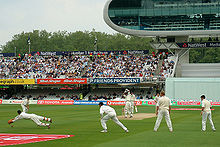 England's Steve Harmison bowling against New Zealand at Lord's.
England's Steve Harmison bowling against New Zealand at Lord's.
Historically, the national cricket team has not been as successful as the national rugby union team. New Zealand played its first test in 1930 but had to wait until 1956 to win its first test. The national team began to have more success in the 1970s and 1980s. New Zealand's most famous cricketer, the fast bowler Richard Hadlee who was the first bowler to take 400 wickets in test cricket, played in this era.
Although traditionally New Zealand have had one of the strongest sides they have never progressed past the semi-finals of the Cricket World Cup where they ended up five times, the semi-finals of the Commonwealth Games and the semi-finals of the Pro20 World Championship. However New Zealand's Woman's Cricket Team has reached the World Cup finals.
Women's team
Main article: New Zealand national women's cricket teamThe New Zealand women's cricket team[1] played their first Test match in 1935, when they lost to England. Since then they have only won two Tests, once against Australia, and once against South Africa.
Their greatest success in one-day cricket was when they won the 2000 World Cup under captain Emily Drumm. In a hotly contested final, they scored 184 to narrowly beat Australia by four runs, Australia being all out for 180
Cricket development
New Zealand Cricket has established High Performance Cricket training centre based at Lincoln University. It also operates a grassroots development programme for school children called 'MILO Kiwi Cricket' . John Wright, former NZ opening batsman, was appointed acting high performance manager for NZC in November 2007.
New Zealand has many private cricket academies and the Bracewell Cricket Academy based at Rathkeale College is one of the largest cricket academies, providing an Overseas Cricket Development Programme, a Pre-Season Coaching Camp, a Festival of Cricket.
There are around 100,000 registered cricketers in New Zealand.[5] By way of comparison, Australia and the UK have around 500,000 each.[6][7] According to Mark O'Neill, New Zealand's batting coach from 2007–09, the competition at club level in NZ is nowhere near as intense as in Australia.
"In Sydney there are 20 first grade teams, each club has five grades. To get to first grade you've got to be a friggin' good player and once you get there the competition is very, very fierce. Unfortunately it's not the same standard [in NZ]. Competition is everything and the only way the New Zealand guys are going to get that is to play the world's best players."[8]
Funding
New Zealand Cricket derives most of its revenue from the sale of 2 types of broadcasting rights.
- Broadcasting rights to home internationals.
- A share of the broadcasting rights the ICC sells to its tournaments, such as the World Cup.
Host nations pick up all the expenses of touring teams, but get sole access to all broadcast rights and gate receipts.
In November 2007 it was announced that NZC had made a 5-year deal for the broadcasting rights to home internationals for NZ$65.4m with Sony Entertainment Television. The previous four-year deal between NZC and ESPN-Star was for only NZ$14.4m. Part of the 5-fold increase in value is due to the Indian team's tour of NZ in 2009.
Immediately prior to the 2009 Indian tour of NZ the Sunday Star Times reported that "NZ Cricket hits $25m jackpot".[9]
The article claimed that NZ Cricket will get $1 million for each of the 22 days the Indians take the field and that NZ Cricket had insured against loss of income for the sale of TV rights due to bad weather. NZC boss Justin Vaughan also said that a tour by India generates "many times" more income than tours by Australia, South Africa and England and that the Indian tour was worth more to NZC than the payout from the Cricket World Cup, which was around $20m.
The article also states that over the past two years, NZC's income has been around $30m, but this year (2009)[dated info] Vaughan is hoping to get more than $40 million from broadcast rights, sponsorship and ticket sales.
In 2007, the ICC sold the rights to broadcast the World Cup, the Champions Trophy and the ICC World Twenty20 to ESPN Star Sports until 2015 for US$1 billion. NZC will receive a slice of that.
Player income
Twenty five per cent of NZC's revenue goes to pay player salaries.
Currently, the top-ranked cricketer, which is likely to be Vettori,[citation needed] earns $174,000 as a basic retainer. This figure decreases in increments of $6000 and players ranked 18-20 now each receive $72,000. Dan Vettori also gets a $40,000-$50,000 captains fee. Players also get match fees of $7325 per test, $3175 per ODI and $2075 per Twenty20 match. On average, they play 10 tests, 25-30 one-day games and around 10 Twenty20 matches a year. There is also prize money for winning games.
The latest pay scales are substantially higher than the old scales. Before the latest deal the No 1-ranked player received a retainer of NZ$128,000. The retainers dropped by NZ$5000 for each ranking until No 17-20, who each received a retainer of NZ$48,000. Players used to receive NZ$6000 per test, NZ$2500 per one-day international and NZ$1500 for a Twenty20 international.
Players such as Vettori, McCullum and Ross Taylor will play in virtually all of NZ's matches. So the top four or five players get between $300,000 and $400,000 from New Zealand Cricket, the next five or six between $180,000 and $300,000.[10]
In addition, the Indian Premier League has signed up five New Zealanders for the folowng amounts: Stephen Fleming NZ$350,000, Daniel Vettori US$625,000, Jacob Oram US$675,000, Brendon McCullum US$700,000 and Scott Styris US$175,000 for a couple of months cricket.[11]
As a result of the new 5-year deal and IPL income, top NZ cricketers are earning more than All Blacks [12] Top-tier NZRU players are paid around NZ$500,000 per year by the NZRU.[13] Dan Carter, the most valuable New Zealand rugby player, is estimated to be between $700,000 and $900,000 a year (including endorsements). McCullum, the highest paid cricketer, is estimated to be earning between $1 million and $1.5 million yearly, which includes IPL payments.[10]
"Banned" Players
Former Black Caps Chris Cairns, Nathan Astle, Chris Harris, Craig McMillan, Hamish Marshall, Lou Vincent and Darryl Tuffey who recently played in the "rebel" Indian Cricket League have been effectively "banned" from ever playing for NZ again. This of course assumes that they are available for selection. Chris Cairns for one, retired at a Twenty20 match against the West Indies in 2006.
Justin Vaughan former NZ Cricket CEO, perhaps with one eye on the legal ramifications, does not use the "b" word but prefers terms such as; "the selectors will be encouraged to consider other players", or "overlooked for selection". It also appears that the players will not be able to hold a contract from their provinces but will be allowed to play on a game by game basis.[14]
In January, 2008 it was announced that Shane Bond had signed a US$800,000 a year contract to play for the ICL for 3 years . Bond's agent Leanne McGoldrick said that Bond intended to honour his contract with NZ cricket until May 2008. However, NZC will "overlook Bond for selection" because all members of the International Cricket Council have agreed not to pick players who have signed for the rebel leagues. NZC will not jeopardise its relationship with the ICC, as it relies heavily on them for funding.[15]
This put Bond and NZC in a precarious position, as prior to signing his ICL contract, he had been given permission to play in the ICL by NZC (believing they were not contravening ICC rules) while still able to play in New Zealand international games. Bond chose not to press the issue, deciding to play solely in the ICL.
In September 1977, Tony Greig, Mike Procter and John Snow with support from Kerry Packer contested the bans they had been subjected to by the TCCB for playing in World Series Cricket in the English high court. The court ruled that the bans were a restraint of trade and therefore illegal.[16]
On January 29, 2008, the New Zealand Herald stated that Bond, who wants to play in the upcoming series against England, and NZ Cricket was released from his NZC contract and will not be chosen on a game-by-game basis. Bond appears to have given up on legal action for restraint of trade.[17]
Heath Mills, the executive manager of the New Zealand Cricket Players Association (NZCPA), was not so conciliatory. He accused NZC of acting to appease the Indian board (BCCI). Mills described the ICC operating manual regulation that purports to not allow [ICC members] to release players to participate in non-sanctioned events as restraint of trade.[18]
Mills also said :
"The NZCPA fully understands the position NZC has found itself and we do not want them to damage relationships with the BCCI and other ICC members. However, pressure to preserve these relationships should not be placed above preserving New Zealand's right to select its best players to represent the Black Caps, the rights and aspirations of New Zealand citizens to represent their country and the legal rights of players under their signed playing contracts. Given the issues Bond has decided to stand aside from international cricket at NZC's request. The NZCPA supports this decision as it enables him to preserve a strong relationship with the board of NZC in the hope that he can again contribute to the game in New Zealand at some stage in the future. However, this is not a decision that he was compelled to make and under our contract system negotiated with NZC it remains open for any player to play for a third party like the ICL and still remain contracted to and play for NZC. It is this situation that leaves the NZCPA concerned for cricket in New Zealand. We urge the ICC to step in and attempt to influence this situation and find a way to manage third party investment in our sport before we lose more players both here and around the world, and international cricket has been damaged further. History has shown that professional sports cannot afford to become split. It is absolutely vital that international cricket remains the pinnacle of the sport and that we ensure the best players are playing."
In any event, Bond himself has said that due to the risk of injury he no longer wants to play test cricket for NZ.[19]
Due to the financial problems as a result of the 2008 'credit crunch', the ICL has cancelled part of its schedule, and offered to release the New Zealand players from their contracts, some of whom have not been paid for several months. If this were realised, the 'ban' on ICL players in ICC-affiliated domestic and international competitions would be lifted, leaving them free to sign contracts with ICC-affiliated sides.
Hopefully now, players are returning to official cricket, like Shane Bond and Daryl Tuffey.
See also
References
- ^ a b Richard Boock (Nov 11, 2006). "Cricket Chief: Eden Park Betrayed". New Zealand Herald. http://www.nzherald.co.nz/a-stadium-for-the-world-cup/news/article.cfm?c_id=1501105&objectid=10410243. Retrieved 2009-09-16.
- ^ Chris Rattue (Aug 28, 2009). "The top 10 oddest trophies in sport". New Zealand Herald. http://www.nzherald.co.nz/cricket/news/article.cfm?c_id=29&objectid=10593608. Retrieved 2009-09-16.
- ^ Peter Williams (Sep 13, 2009). "Peter Williams: Future cricket looks shorter". New Zealand Herald. http://www.nzherald.co.nz/cricket-world-cup/news/article.cfm?c_id=497&objectid=10596892. Retrieved 2009-09-16.
- ^ DAVE WORSLEY (Oct 15, 2003). "College sport: St Kents offers cricket as subject". New Zealand Herald. http://www.nzherald.co.nz/college-sport/news/article.cfm?c_id=153&objectid=3528871. Retrieved 2009-09-16.
- ^ "Cricket". Media Resources -- Tourism New Zealand's site for international media and broadcast professionals.. 2009-09-16. http://www.newzealand.com/travel/media/tourism-media-homepage.cfm. Retrieved 2009-09-16.
- ^ how many cricket players are there throughout the UK
- ^ Hot for it
- ^ Chris Barclay (19 January 2008). "Cricket: The Aussie with hard words for our top order". The New Zealand Herald. http://www.nzherald.co.nz/topic/story.cfm?c_id=128&objectid=10487598&pnum=2. Retrieved 10 September 2011.
- ^ Donaldson, Michael (21 February 2009). "NZ Cricket hits $25m jackpot". The Sunday Star-Times. http://www.stuff.co.nz/4855617a1823.html. Retrieved 26 September 2011.
- ^ a b Andrea Milner (1 March 2009). "Danny Lee on par for massive earnings". The New Zealand Herald. http://www.nzherald.co.nz/business/news/article.cfm?c_id=3&objectid=10559277&pnum=3. Retrieved 10 September 2011.
- ^ David Leggat (17 December 2007). "Cricket: Whopper payouts will test team spirit". The New Zealand Herald. http://www.nzherald.co.nz/topic/story.cfm?c_id=128&objectid=10482779. Retrieved 10 September 2011.
- ^ Dylan Cleaver (4 November 2007). "Cricket: Cricket deal to rival rugby". The New Zealand Herald. http://www.nzherald.co.nz/topic/story.cfm?c_id=116&objectid=10473895. Retrieved 10 September 2011.
- ^ Steve Deane (24 November 2007). "Rugby: Dan Carter open to offers from UK". The New Zealand Herald. http://www.nzherald.co.nz/topic/story.cfm?c_id=116&objectid=10478081. Retrieved 10 September 2011.
- ^ "NZ Cricket bans six rebels". The Sunday Star-Times. http://www.stuff.co.nz/4340511a10133.html. Retrieved 26 September 2011.
- ^ "Bond to cash in as rebel". The Dominion Post. http://www.stuff.co.nz/4343692a1823.html. Retrieved 26 September 2011.
- ^ See World Series Cricket - Court Case
- ^ "Cricket: Mills fears for future after Bond's exit". The New Zealand Herald. 29 January 2008. http://www.nzherald.co.nz/section/4/story.cfm?c_id=4&objectid=10489367. Retrieved 10 September 2011.
- ^ New Zealand board attacked for Bond decision
- ^ "Bond's leaving fuels fears for cricket". The Dominion Post. 29 January 2008. http://www.stuff.co.nz/4377903a10133.html. Retrieved 26 September 2011.
External links
- New Zealand cricket
- BLACKCAPS official website
- Beige Brigade Official Website
- Cricinfo New Zealand
- A somewhat wacky site - Fun with the Black Caps
- Cricket database
- Runs on the board - New Zealand cricket (NZHistory)
Cricket in New Zealand Governing body National Teams Regional Teams Women's Teams Auckland Hearts · Canterbury Magicians · Central Districts Hinds · Northern Districts Spirit · Otago Sparks · Wellington BlazeCompetitions Test & ODI Grounds Christchurch · Wellington · Auckland · Dunedin · Napier · Hamilton · Dunedin University Oval · Wellington Westpac · QueenstownPlayer lists Series lists History to 1890 · 1882–83 · 1890–91 to 1918 · 1918–19 to 1945 · 1945–46 to 1970 · 1970–71 to 2000 · from 2000–01National Cricket Articles Full ICC Members Australia · Bangladesh · England · India · New Zealand · Pakistan · South Africa · Sri Lanka · West Indies · ZimbabweAssociate Members Argentina · Belgium · Bermuda · Botswana · Canada · Cayman Islands · Denmark · Fiji · France · Germany · Gibraltar · Hong Kong · Ireland · Israel · Italy · Japan · Jersey · Kenya · Kuwait · Malaysia · Namibia · Nepal · Netherlands · Nigeria · Papua New Guinea · Scotland · Singapore · Tanzania · Thailand · Uganda · United Arab Emirates · United States of America · Zambia · VanuatuAffiliate Members Afghanistan · Austria · Bahamas · Bahrain · Belize · Bhutan · Brazil · Brunei · Bulgaria · Cameroon · Chile · China · Cook Islands · Costa Rica · Croatia · Cuba · Cyprus · Czech Republic · Luxembourg · Saudi Arabia · BrazilNon Members Iceland · RussiaCategories:
Wikimedia Foundation. 2010.

